Recent News & Events

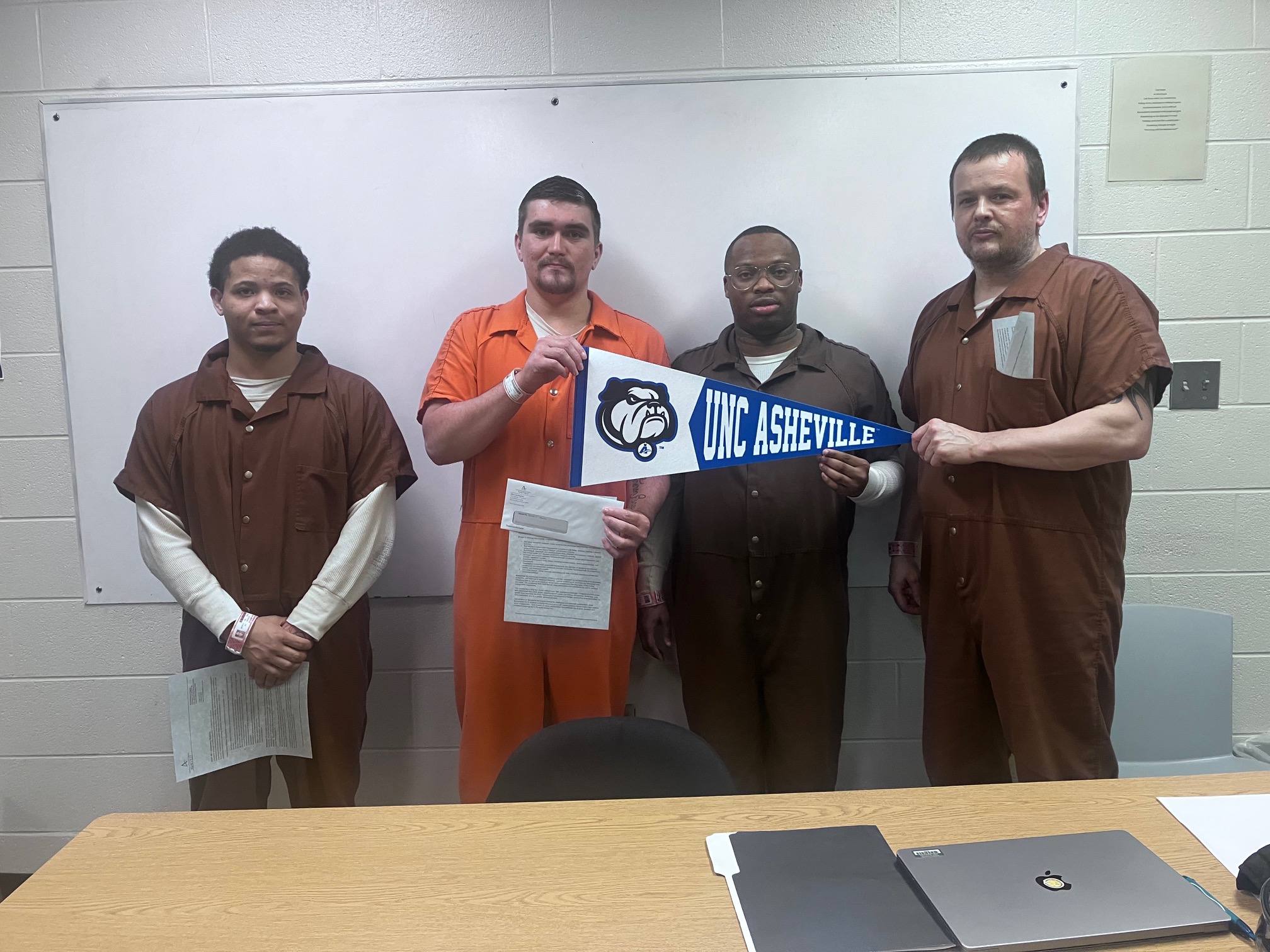
Education Behind Bars: UNCA Prison Education Program Celebrates Student Success
Fall 2025
Written by Matthew Ellington
Small but deeply meaningful ceremonies held in a tiny classroom at Buncombe County Detention Facility mark the completion of each UNCA class, conferring hard earned college credit to men and women detained there awaiting trial. These ceremonies – complete with speeches, handshakes, official college transcripts, cherished cups of coffee and sweets, and an appreciative audience of Buncombe County Officials – also mark the crossing of a powerful threshold, conferring a distinction of “scholar” to people most often identified as detainees.
On September 15th, men in STAT 185: Introduction to Statistics gathered for their completion ceremony. Just two days later, on September 17th, women who completed SOC 100: Introduction to Sociology celebrated their own milestone. Then, on November 17th, women celebrated the completion of HUM174: Fate and Free Will in Greek Tragedy, and men were honored for their successful work in SOC100 on November 19th.
These courses, taught through the UNC Asheville Prison Education Program (PEP), mark more than academic achievement; they represent the transformative potential of education in places too often defined by loss, silence, and limitation.
“The program made me feel like my education mattered — and that I mattered.”
For many of the students, that feeling — of mattering, of being seen again as learners and thinkers — became the heart of their experience. Some described how the program helped them “push for progress,” others said it “reminded [them] how smart [they] are.”
One student reflected that simply showing up for class each week brought light into a dark place — proof that growth and self-discovery can happen even in confinement. Another said the course “pulled me out of my head,” helping them reengage with a sense of purpose.
Each voice carried a common thread: education as restoration, as renewal, as a way back to themselves.
Education as Restoration
At its heart, the Prison Education Program embodies UNCA’s mission: that learning should expand our understanding of the world and of ourselves. For students inside the Buncombe County Detention Facility, this belief is not theoretical — it’s a lifeline.
Inside the facility, classroom conversations blend academic inquiry with lived experience. For the women of Sociology 100, discussions of social systems and inequality often mirrored their own realities. For the men in Statistics 185, mathematical reasoning became a form of empowerment — a way to see patterns, analyze data, and reclaim confidence in their ability to think critically and create meaning.
These reflections echo a broader truth about higher education: that learning is not only about knowledge acquisition, but about identity, hope, and belonging.
Faculty who teach within BCDF describe the experience as one in which the power of education – conversation, curiosity, challenge and achievement – illuminates the truth of human potential both for their students and for themselves.
Dr. Ella Siegrist, who taught Introduction to Sociology, said that her students’ curiosity and openness “created one of the most genuine learning environments I’ve ever experienced.” For her, the classroom wasn’t defined by walls or circumstance but by dialogue — a space where humility and intellectual curiosity shaped every discussion.
Dr. Emmy Shanahan, who teaches Greek tragedy at the facility, noted that incarcerated scholars often bring “a depth of insight few others could,” connecting ancient questions of fate and responsibility to their lived realities.
Together, these educators describe their work at BCDF as both humbling and deeply affirming — a reminder that the essence of education lies not in privilege, but in shared humanity.
A Shared Commitment
The UNCA Prison Education Program is supported by the Laughing Gull Foundation, which has made it possible to provide college-level courses free of cost to incarcerated students. But sustaining this work — and expanding it — depends on something more enduring: the commitment of a university community that believes education should be accessible to everyone.
This work reflects UNCA’s values of equity, inclusion, and social responsibility. It also challenges us, as students and citizens, to reimagine who education is for and what it can do. Every classroom inside BCDF becomes a microcosm of that question — and of its answer.
One graduate summed up their journey simply: “I plan to put this toward future degrees.” That kind of hope is contagious.
As the program evolves, so do opportunities for collaboration. UNCA students and faculty are exploring new ways to connect — from book circles and bridge programs, to student teaching assistants and campus volunteer roles supporting future offerings.
These partnerships aren’t about charity; they’re about community. They reflect what Dr. Siegrist called “a culture of curiosity and humility” — one that can extend beyond the detention center into UNCA’s own classrooms and campus life.
When we extend learning beyond campus walls, we affirm that education is a public good — one that thrives only when it includes everyone.
For those who attended the recent celebrations, the pride was palpable — in the eyes of the students, the words of their professors, and the unmistakable sense that something profound had taken place.
Education, in a carceral space, is not a privilege. It is a form of freedom.
“Education in these spaces isn’t about excusing anyone’s actions,” said the program’s Communications Coordinator and PEP alum Matthew Ellington. “It’s about preparing people to return as neighbors who have a sense of purpose and can participate fully in the community again -.”
Looking ahead, the Prison Education Program plans to broaden its reach — developing new course offerings, volunteer opportunities, and reentry partnerships that connect students’ learning inside the facility with their lives beyond it. “What’s most important are the relationships we’ve cultivated with the students, Buncombe County Detention Facility, the officers, the county itself. We work together in the shared recognition that everyone, no matter what, is worthy of the fair chance education offers,” says Leslee Johnson, UNC Asheville’s PEP director. “Inviting more people from our campus and local community to participate and experience this is our current goal. Education is not a panacea, can’t fix all the problems, but it is a means to elevate human worth and potential and allow everyone, regardless of circumstance, to envision and create a future we all want, and rightfully deserve, to be part of.
For those who attended the recent graduations, the sense of pride was unmistakable. In a place not often associated with celebration, there was applause, laughter, and even a few tears.
As one instructor put it, “It’s hard to leave those classrooms without believing in second chances.”
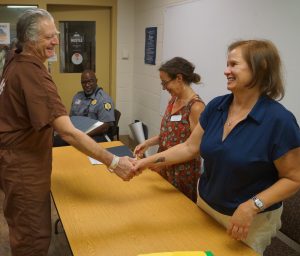
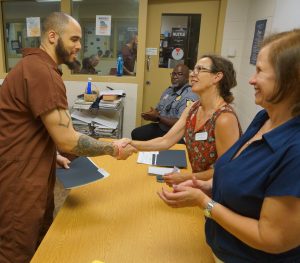
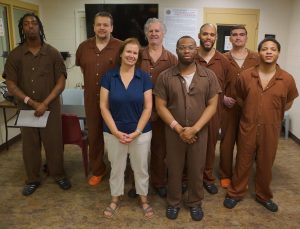
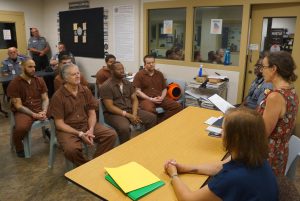
Celebration of Course Completion: Buncombe County Detention Facility
Spring 2025
Written by Ashton Henderson
At UNC Asheville, we believe education is a human right and a powerful catalyst for positive change. Our Prison Education Program (PEP) brings credit-bearing general education and liberal arts courses into correctional facilities, creating opportunities for incarcerated students to pursue intellectual growth, build confidence, and prepare for successful reentry into society. Prison education extends beyond the classroom. We work to guide incarcerated students toward a better future and ensure lower recidivism rates.
Numerous studies have shown that prison education is one of the most effective tools in reducing recidivism and creating a more effective justice system. According to the RAND Corporation, incarcerated individuals who participate in educational programs are 43% less likely to return to prison than those who do not. Additionally, every dollar invested in prison education saves nearly five dollars in reincarceration costs. By equipping individuals with academic skills, critical thinking abilities, and a renewed sense of purpose, programs like UNC Asheville’s PEP significantly improve post-release outcomes. These efforts not only benefit the individual but also contribute to safer communities and a more just, rehabilitative criminal justice system.
The real power of our work, though, is not in the statistics. It’s in the stories of real people. UNCA Professor Martha Gates recently shared her experience with the Prison Education Program. Teaching a variety of classes in a number of different correctional facilities, Professor Gates believes that educating incarcerated students gives them something that cannot be taken away. She states, “Learning and pursuing a better future has helped a number of my students build confidence, and instills pride in them. Behind the cement walls of prison, it is easy to feel helpless, but engaging in academics allows them to see themselves as capable, as worthy.” Professor Gates also stressed the importance of expanding prison education. “In the future, I would really love to see prison education being implemented in every correctional facility, and for students to be able to receive full degrees. Ten to twelve weeks of education is simply not enough.”
Professor Gates taught MCOM 104: Introduction to Mass Communication for UNC Asheville’s program at the Buncombe County Detention Facility (BCDF) this spring. Over the course of 8 weeks, a class of 8 men examined ethical theories and frameworks used in mass communication, applied them to real-world scenarios and case studies, strengthened public speaking and speechwriting skills through structured assignments and presentations, and engaged in meaningful dialogue with peers, fostering collaboration and thoughtful engagement on media-related issues. This course transfers as a social science general education requirement and gives students a foundation in writing, public speaking, information literacy, and various modalities of communication. Students celebrated their successful completion of the class on June 23rd. In an anonymous exit survey created by PEP alum Matthew Ellington, one student reported, “[The class] provided me with the confidence to move forward with my education.” Another wrote, “My confidence and ambition have grown tremendously.” When asked about the most positive or meaningful part of their experiences, students praised “teamwork and preparation for each class”; “public speaking”; and “the whole experience, really . . . it definitely is a motivation towards something better while in jail.” The experience of the class, in one student’s words, made him aware of his “ability. College was intimidating at first,” he writes. “Now I know I’ll do better than fine.”
UNC Asheville continues its offering of credit-bearing classes at the detention facility, currently offering SOC 100: Introduction to Sociology to 8 women, taught by Professor Ella Siegrist. Due to the shorter-term nature of an individual’s stay at the jail, where detainees are awaiting trial—the outcomes of which could be release into their home communities or transfer to a state prison to serve longer sentences—these classes offer a foundation for continuing their education at community colleges, universities, and other prison education programs. In order to guide students in these determinations, UNC Asheville programming at BCDF includes academic advising, educational goal-setting, and support for navigating questions about transfer, financial aid, and application processes. All students at BCDF receive a sealed copy of their official college transcripts at the conclusion of every course. UNC Asheville’s program is currently at work setting up a student resource center in person at the facility to provide continuous support for students currently enrolled in classes and individuals at the facility who are curious about what it would look like to continue their education on the inside and in their home communities.
Prison education confronts the outdated narrative of who deserves a second chance. For many incarcerated students, access to college-level courses is the first time they are seen as scholars, not just inmates. Education builds self-respect, discipline, and hope, offering tools that prepare individuals for successful reintegration into their communities. It challenges the cycle of incarceration by replacing punitive social isolation with real opportunity.
We invite you to join us in this work. The pursuit of a better justice system is collective and evolving. Whether you’re a faculty member, a community partner, a potential donor, or a volunteer mentor, your involvement helps open doors for those who deserve a second chance. Together, we can expand access to opportunity and empower people to reclaim their future—one course at a time.
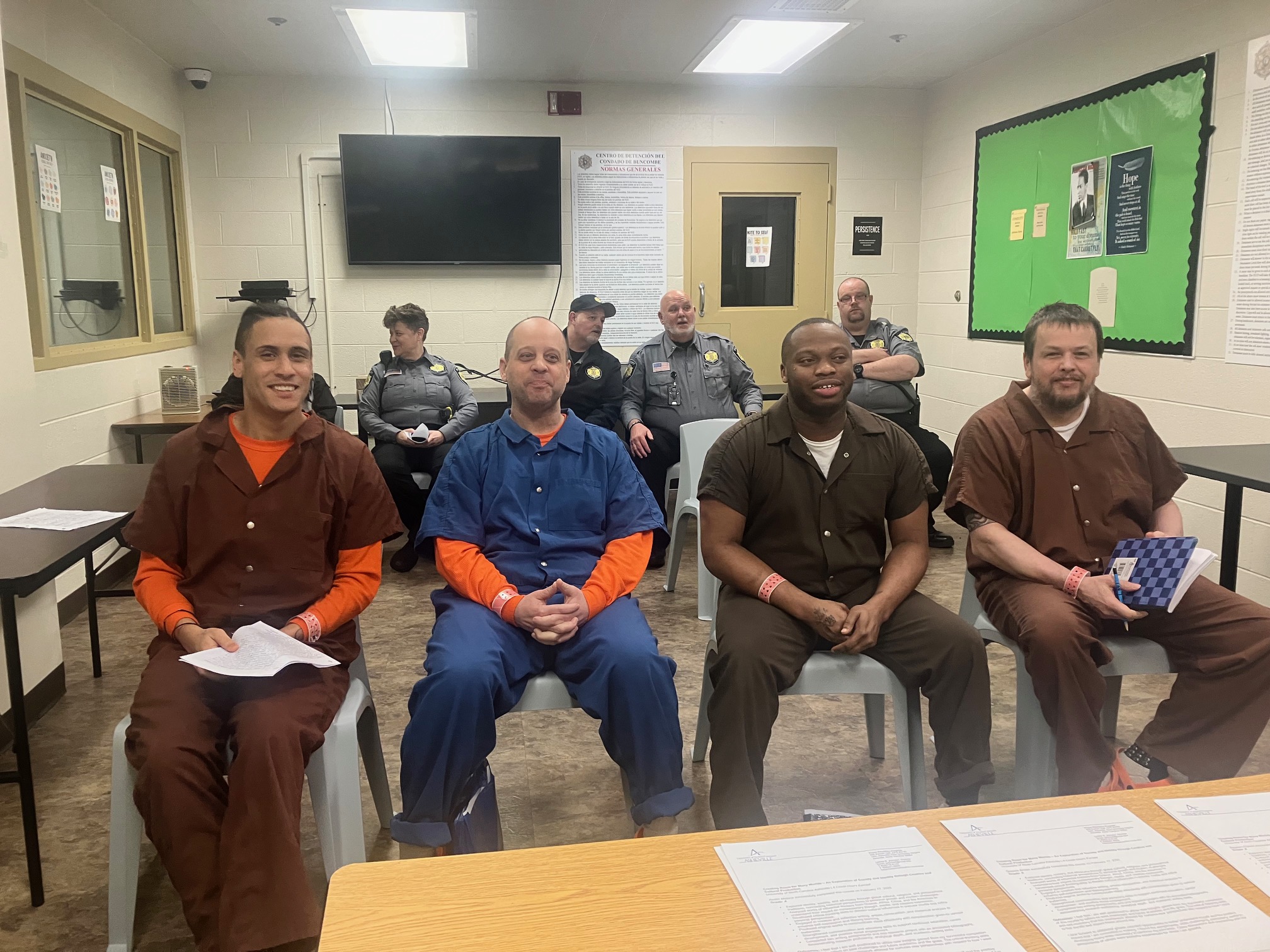
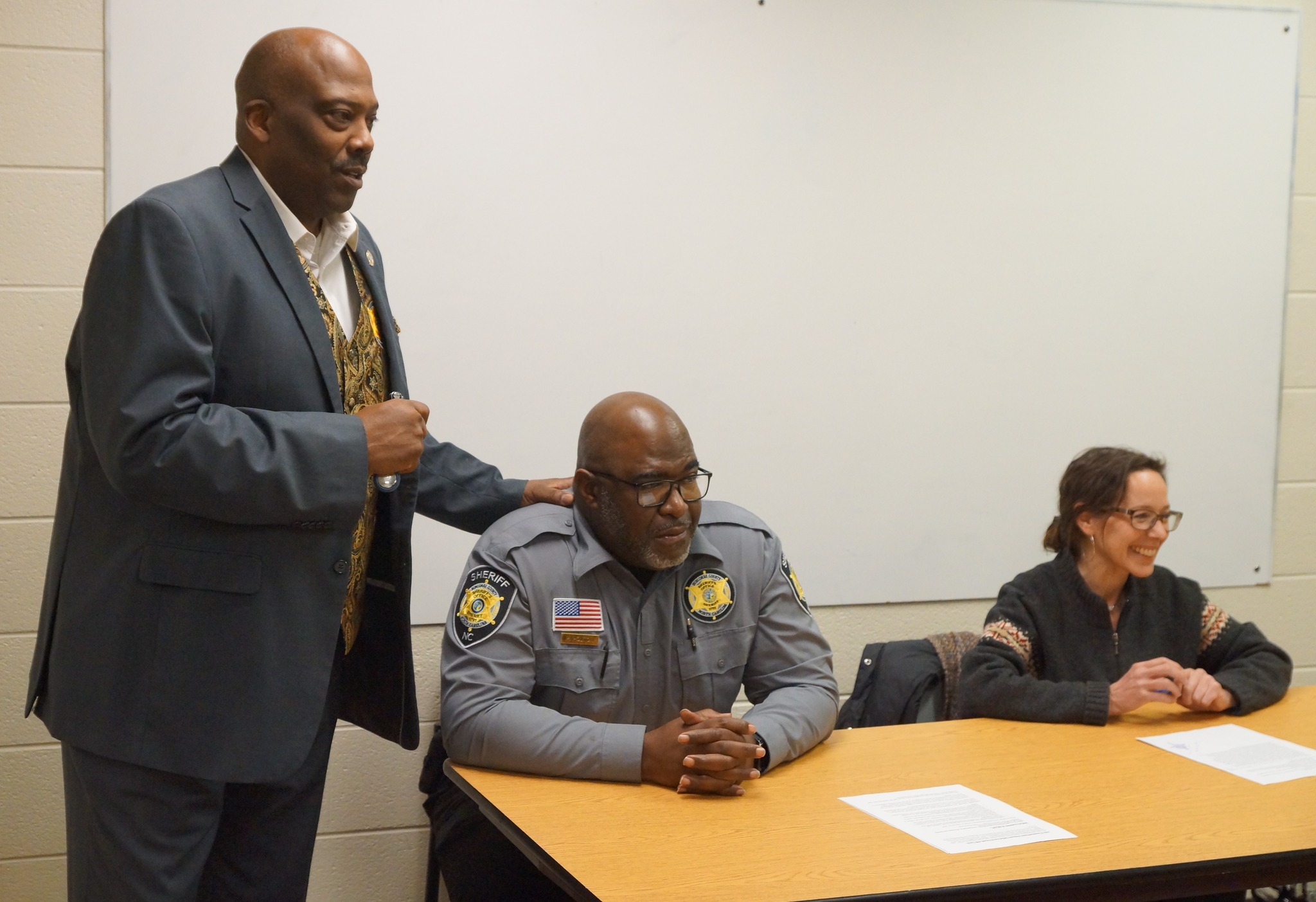
Celebration of Course Completion: Buncombe County Detention Facility
Spring 2025
A note from our Director, Leslee Johnson
On Monday, February 17th, 2025, our program celebrated the completion of our first college-credit bearing course at Buncombe County Detention Facility with the students and Buncombe County officials. Officer Michael Holton, programming supervisor at BCDF, and Buncombe County Detention Facility as a whole provided crucial support and hard work in making HUM174, a class that transfers across community colleges and universities as a general ed humanities elective, a reality. We are all excited to continue this relationship in which UNC Asheville’s Prison Education Program offers college credits to Buncombe County detainees. Sheriff Quentin E. Miller was in attendance to congratulate students and voice support for the value and continuation of offering college classes to incarcerated individuals in Buncombe County.
The students who completed the course with top grades – Mr. Brown, Mr. Cordell, Mr. Kitchen and Mr. Malone – consistently showed up with energy, dedication, creativity, and sharp intelligence to work, learn and to teach me, each from their own perspective and imagination. We covered a lot of ground from within the classroom. Students dug deep into origin stories of the past, and crafted their own origin stories, influenced by ancient religions and cosmologies. They mined the present through research – everything from media bias on race, to hate speech, to indigenous sovereignty, to the role of religion in social justice movements – and they projected future visions of a world from their imaginations, informed by what they’d learned, creating science fiction pieces rooted in ancient wisdom and possibilities both hopeful and just. As their instructor, I had a hard time keeping up, sometimes! As Director of UNCA’s PEP and instructor of the first course, it was a pleasure to serve in this capacity, and to work towards continuing this collaboration, supporting the academic and professional futures of these and future students.
Students were presented students with their official transcripts, and a certificate of completion of HUM174 that names what they’ve accomplished:
- Explored identity, society, and advocacy through global cultural, religious, and philosophical traditions, connecting historical perspectives to personal growth and modern challenges.
- Analyzed works of influential thinkers from Africa, India, and the Americas to understand their impact on contemporary thought, media, and creative expression.
- Developed critical thinking skills to discern cultural influences in popular media and refine personal perspectives.
- Engaged in creative and reflective writing, artistic composition, and rhetorical analysis to enhance self-expression and lifelong learning.
- Produced original works to communicate ideas effectively with consideration given to various audiences.
- Strengthened communication and advocacy skills to support continued education, career development, and positive social engagement.
- Completed two writing assignments and one research project with an annotated bibliography, demonstrating research proficiency, analytical depth, and academic writing skills.

Collaboration with Buncombe County Detention Facility
Fall 2024
In Fall 2024, the Prison Education Program began collaborating with Buncombe County Detention Facility to offer credit-bearing college courses at the facility. Delivery of courses was delayed due to Hurricane Helene, and the first course, HUM174: Creating Room for Many Worlds: An Exploration of Society and Identity through Creative and Cultural Production, began in November 2024. A celebration of course completion, in which students will be presented with documentation of their success and its value in their future endeavors takes place on Friday, February 21, 2025. The course transfers to community colleges and universities as a general education requirement.

Laughing Gull Foundation Grant
November 2024
In November 2024, UNC Asheville’s Prison Education Program was awarded a $50,000 grant by the Laughing Gull Foundation (LGF) to support the program, specifically our collaboration with Mayland Community College.
From the award announcement:
This grant will ultimately support the delivery of academic and career advising support as well as credit bearing classes that build towards an Individualized Degree (BS) in Entrepreneurship, Health and Computer Sciences for incarcerated students. Prior to delivery of coursework, this one-year grant would fund targeted, integrated academic and career advising, provided by advisors from UNC Asheville Office of Academic Advising and Career Center to students enrolled in the Associates of Applied Science degree in Business Administration at Mayland Community College, preparing them to matriculate into the four-year BS degree program at UNC Asheville and providing students with knowledge and resources to leverage their study and degrees towards employment opportunities post-release.
UNC Asheville Prison Education Newsletters
Keep up to date with our programs via our quarterly newsletter highlighting our students, partners, instructors and community involvement.
- April 2022
- April 2023
- August 2021
- June 2021
- May 2021
- April 2021
- March 2021
- February 2021
- January 2021
- December 2020
- November 2020